Did you know that Santa Claus does not come down the chimney? Nope. Not required. Doesn’t happen. Never a factor in my childhood.
Perhaps a little explanation is in order. Both of my grandmothers were immigrants from Norway, and like most mothers, they controlled the culture in the family. That means I was raised Lutheran, love to eat a carb-heavy potato dumpling called “krub,” and know, without a doubt, that Santa Claus does not come down the chimney.
Santa comes through the front door, and he isn’t even the most important person there. The key figure is the Julenisse, a Christmas elf. All Nisse are short and wear red caps. They are not attractive creatures but have magical powers and a wicked sense of humor. Every farm has its own Nisse, who takes special care over the animals. If you do not treat your livestock well the Nisse will not treat you well. Remember that when you make your Christmas list.
On Christmas Eve the Julenisse knocks on the door, carrying a sheaf of hay for the livestock. He asks if there are any good children living at this house. If the answer is yes, his helper, Santa Claus, will leave some small gifts for the family while the Nisse goes to the barn to give special attention to all creatures great and small.
As a child, I loved these stories and accepted their veracity just as I realized that for some people Santa popped down a chimney.
Door or chimney, it made no difference. To each his own.
As an adult these lessons of my childhood manifest themselves in a serene and sincere tolerance. Christmas is a religious holiday for some but it also has been usurped as a secular holiday for much of the world. In either case, goodwill and expansive hopes for a generous spirit and peace in abundance seem to be the universal themes. Either because of a belief in the birth of a Savior or a wish to spend a few slim days at the end of each year in celebration of our better angels, Christmas becomes a happy time.
I have never cared if you wish me a Merry Christmas, a happy holiday or a generic, one-size-fits-all wish to “have a good day.” It is nice to have a benediction placed on one’s head. These are difficult times, and we can all use a token of consideration.
Just as George Bailey in It’s a Wonderful Life and Ebenezer Scrooge in A Christmas Carol find new life in stories of despair, revelation and redemption, so do each of us use Christmas as a reason to reset our humanity meter. Have we gotten a little too jaded? A little too angry? A little too depressed? Have we spiraled in toward our problems to the exclusion of others and their lives of quiet desperation? Christmas offers a built-in chance to look outward. Christmas tells us that there are good reasons to spread our arms around others. It lets us know that when you share your fear you can become braver. When you share your loss, you can gain back some strength. When you share your hope, you can find help. And when you share happiness, you can find joy.
The Christmas elf of my childhood always took special care of the beasts in the barn because they could not take care of themselves. That is not a bad lesson to learn in your youth. There are times when all of us need to receive a moment of kindness. If Christmas becomes a vehicle for providing that outreach, then whether you think in terms of Christ or karma you are providing a gift to mankind.
During this season, find a chance to do good and then disappear. You might find a Julenisse watching you from some hidden nook and he will know that you keep the faith.Louise Butler is a retired educator and published author who lives in Edinburg. She writes for The Monitor’s Board of Contributors.





